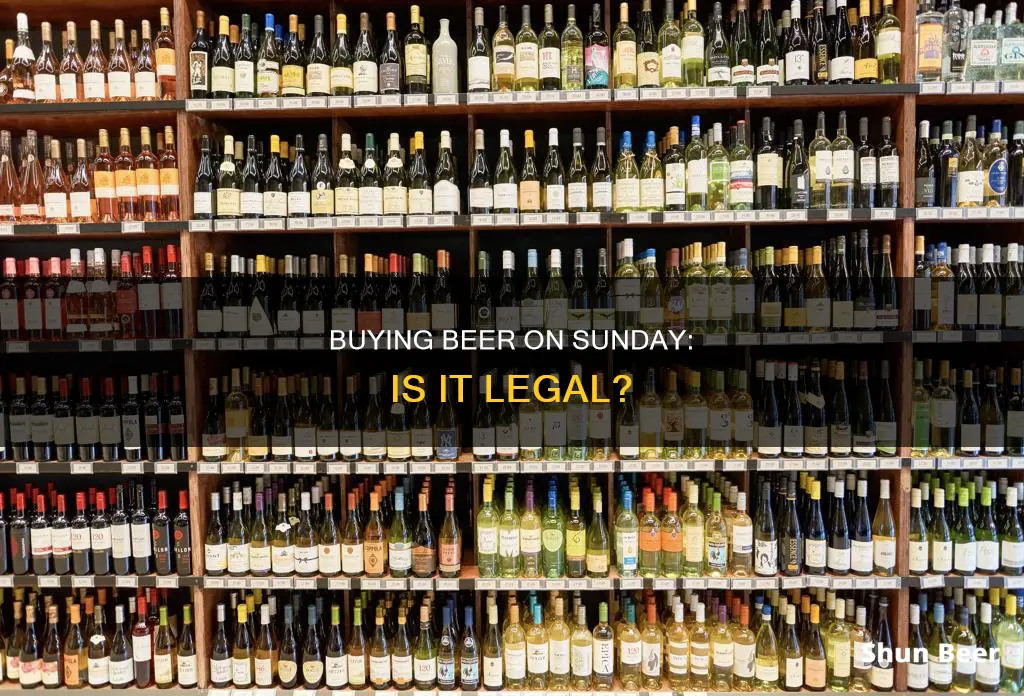
Depending on where you live, buying beer on a Sunday can be illegal. In the United States, these laws are known as blue laws, which are designed to restrict certain activities on Sundays. While blue laws are slowly fading away, as of 2019, 28 states still enforce some form of them. These laws are rooted in the colonial-era Puritan tradition of prohibiting certain activities on the Sabbath. While the United States has relaxed some of these restrictions, laws prohibiting the sale of alcohol on Sundays persist in several states.
| Characteristics | Values |
|---|---|
| Location | The sale of beer on Sundays is dependent on the location. For example, in Texas, beer can be sold from 10 am to midnight on Sundays, whereas in Georgia, off-premise sales of alcohol on Sundays are not permitted. |
| Time | Where sales are permitted, they are often restricted to certain times. For example, in Texas, beer can be sold from 10 am to midnight on Sundays, whereas in Illinois, alcohol sales are not permitted until 11 am on Sundays. |
| Type of Alcohol | In some states, the type of alcohol being sold is also a factor. For instance, in Texas, the sale of liquor is prohibited on Sundays, but beer and wine can be sold. |
| Type of Store | The type of store also plays a role, with some states allowing the sale of alcohol in grocery and convenience stores, while others restrict sales to liquor stores. |
What You'll Learn
- Blue laws restrict Sunday beer purchases in some US states
- In Texas, beer can be bought from 10 am to midnight on Sundays
- Alabama has dry counties where alcohol sales are banned
- In some states, beer can be sold in supermarkets, but spirits cannot
- In some states, beer sales are allowed in supermarkets, but only on Sundays

Blue laws restrict Sunday beer purchases in some US states
Blue laws, also known as Sunday laws, are laws that restrict or ban some or all activities on specified days, most often Sundays. These laws are enforced in parts of the United States, as well as some European countries, and are designed to promote the observance of a day of rest. While most blue laws have been repealed in the United States, many states continue to impose tighter restrictions on the sale of alcoholic drinks on Sundays.
In Texas, blue laws prohibit the sale of liquor on Sundays, with additional restrictions on beer and wine sales. Beer and wine can be purchased from 10:00 a.m. to midnight on Sundays, while liquor stores must remain closed. This reflects stringent regulations aimed at limiting alcohol consumption. The Texas Alcoholic Beverage Code outlines the hours of sale and consumption for various types of alcoholic beverages, including specific restrictions such as prohibiting liquor sales on Thanksgiving Day, Christmas Day, and New Year's Day.
Other states with similar blue laws include Alabama, Arkansas, Connecticut, Georgia, Indiana, Massachusetts, and Tennessee. These states have various restrictions on the sale of alcohol on Sundays, with some counties completely prohibiting alcohol sales on this day. For example, in Massachusetts, bars are prohibited from promoting happy hours on Sundays, and in South Carolina, restaurants need a special permit to sell alcohol on Sundays.
While blue laws regarding alcohol sales vary across the United States, they all share the common purpose of restricting certain activities on Sundays, whether it be the sale of alcohol, cars, or hunting. These laws have a long history, dating back to colonial times and the Puritan influence, and while some are being rolled back, they continue to shape commercial activities and community standards in many states.
Buying Beer on Sundays in Tennessee: What's Allowed?
You may want to see also

In Texas, beer can be bought from 10 am to midnight on Sundays
Texas has strict laws regarding the sale of alcohol, which vary depending on the type of alcohol and the day of the week. Beer and wine can be purchased from 10 am to midnight on Sundays, but there are some important details to keep in mind. Firstly, these sales are restricted to grocery and convenience stores. Liquor stores remain closed on Sundays, as well as on Thanksgiving, Christmas, and New Year's Day. This is a result of Texas "blue laws", originally enacted in 1961, which prohibited the sale of certain items on consecutive weekend days. While many of these laws have since been repealed, restrictions on alcohol sales remain.
The hours when beer and wine can be sold on Sundays were updated in 2021 with the passing of HB 1518, which moved the start time from noon to 10 am. This change provides greater flexibility for consumers, who previously had more limited options for purchasing alcohol on Sundays. It's worth noting that this law does not apply to liquor sales, which are still prohibited on Sundays.
In addition to the day of the week, the time of day also impacts the legality of alcohol sales in Texas. Beer and wine can be sold from 7 am to midnight, Monday through Friday, and from 7 am to 1 am on Saturdays. Liquor sales are permitted from 10 am to 9 pm, Monday through Saturday. These laws are enforced by the Texas Alcoholic Beverage Commission (TABC), which writes specific regulations to enforce alcohol-related laws in the state.
It's important to be aware of these laws when purchasing alcohol in Texas, as violations can result in legal consequences. While the laws can be complex and confusing, they are in place to regulate alcohol consumption and maintain community standards and values.
Buying Beer Late in New York: What's the Limit?
You may want to see also

Alabama has dry counties where alcohol sales are banned
In the United States, laws restricting or banning certain activities on Sundays are known as "blue laws". While most blue laws have been repealed, many states continue to impose tighter restrictions on the sale of alcoholic drinks on Sundays.
Alabama is one of the many states with strict laws related to virtually all aspects of alcohol, including manufacturing, distributing, selling, and consuming. The state has several dry counties, meaning there are very few, or no options for purchasing alcohol. However, it is important to note that Alabama also has wet counties where alcohol sales are legal, and moist counties where some cities have voted to allow alcohol sales.
In Alabama, the sale of alcohol is controlled by the Alabama Alcohol Beverage Control Board, which has been regulating distribution, sales, and licensing since 1937. While state-run liquor stores are closed on Sundays, grocery stores and private liquor stores can sell alcohol from 6 am to 2 am, seven days a week. The specific hours for selling alcohol are set by the individual counties and cities.
The availability of alcoholic beverages in Alabama varies depending on the county. Out of the 67 counties in Alabama, none are completely dry, 26 are partially dry or "moist", and 41 are completely wet. While some counties may prohibit the sale of alcohol entirely, others may only restrict sales on certain days or within certain hours. It is essential to be aware of the local laws and regulations regarding alcohol sales in each county.
Bass Beer: Still Available and Where to Buy It
You may want to see also

In some states, beer can be sold in supermarkets, but spirits cannot
Alcohol laws vary from state to state in the US. While some states allow the sale of beer, wine, and liquor in grocery stores, others have more stringent restrictions. In some states, beer can be sold in supermarkets, but spirits cannot.
For instance, in Oregon, grocery stores are not permitted to sell spirits. Beer and wine can be found at the back of most grocery stores, but liquor is only available at designated liquor stores. This is similar to the situation in Washington, where liquor can be purchased in larger commercial grocery stores but not in smaller ones.
Colorado is another state with similar restrictions, where liquor stores, breweries, vintners, and distilleries are the only places to legally buy full-strength beer and wine. Grocery stores are not permitted to sell liquor, wine, or full-strength beer in Colorado.
In contrast, states like California allow consumers to buy beer, wine, and liquor at the grocery store.
These variations in alcohol laws are a result of the repeal of federal prohibition in 1933, which left regulation up to individual states. Even though federal prohibition was repealed, some states remained dry for decades afterward. For example, Kansas did not end prohibition until 1948, and Mississippi was the last holdout, continuing the ban on alcohol sales until 1966.
Buying Beer in Connecticut: Grocery Store Rules Explained
You may want to see also

In some states, beer sales are allowed in supermarkets, but only on Sundays
In the United States, the sale of alcohol is restricted or banned on Sundays in some states due to "blue laws". These laws were established to restrict certain activities on Sundays, particularly to promote the observance of a day of rest and restrict commercial activities. While many blue laws have been repealed in recent years, some states still uphold specific regulations regarding alcohol sales on Sundays.
One example of a state with such regulations is Texas, where beer and wine can be purchased from grocery and convenience stores on Sundays, but only from 10 a.m. to midnight. In contrast, the sale of liquor is prohibited on Sundays, and liquor stores must remain closed. These laws reflect Texas's efforts to limit alcohol consumption and provide a mandatory day of rest for workers.
Another state with similar restrictions is North Carolina, where alcohol sales are prohibited between 2 a.m. and either 10 a.m. or 12 p.m. on Sundays, depending on the county. Additionally, off-premise sales of liquor are not allowed on Sundays.
In Georgia, Sunday off-premise alcohol sales were prohibited until 2011, when the state amended its laws to allow qualified breweries to sell beer for carryout. Restaurants and taverns are generally still permitted to serve alcoholic beverages on Sundays.
While blue laws vary across the United States, they often apply to the sale of alcohol, with some states imposing tighter restrictions than others. These laws can impact the availability of beer, wine, and liquor in supermarkets and other retail outlets, particularly on Sundays.
Ginger Beer Buying Guide: What to Look For
You may want to see also
Frequently asked questions
It depends on where you live. In the US, laws restricting the sale of alcohol on Sundays, known as "blue laws", are determined at the state level. As of 2019, 28 states still have some form of these laws.
Blue laws date back to colonial times and were originally intended to protect Sunday as a day of worship by limiting secular and commercial activities. The term may come from the fact that these laws were transcribed onto blue paper, or that "blue" was a derogatory term for the puritanical nature of the regulations.
Blue laws are slowly fading away, with more states rolling back restrictions every few years. However, as of 2024, many states still have laws restricting the sale of alcohol on Sundays, including Texas, Georgia, and Arizona.
In Texas, the sale of liquor is prohibited on Sundays, and liquor stores must remain closed. Beer and wine sales are permitted in grocery and convenience stores from 10 am to midnight on Sundays. In Georgia, off-premise alcohol sales on Sundays were prohibited until 2011, and sales are still restricted before 12:30 pm on Sundays. In Arizona, alcohol sales on Sundays were limited to between 10 am and 2 am until this law was repealed in 2010.
Yes, blue laws can restrict various activities on Sundays beyond the sale of alcohol. For example, in some states, hunting or selling cars is prohibited on Sundays.







